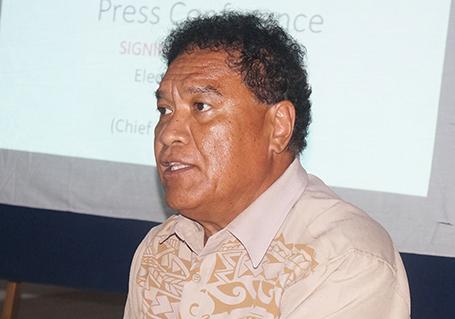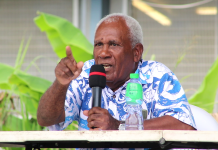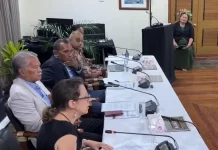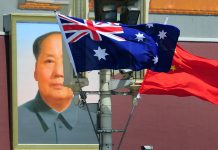By Mose Saitala
[I have read an article from the Development Policy blog of ANU insinuating that the way SIICAC, and therefore the Act, were constructed will push them to fail. I disagree and I hope this article will not only shed light on the genesis and gist of the Anti-Corruption Act 2018 and the Solomon Islands Independent Commission Against Corruption (SIICAC) but that it will also help those who are and have conducted research work into the fight against corruption in Solomon Islands]
Prime Minister Danny Philip in 2011 conceived and commenced the pursuit of the fundamental reform programme. He was ousted barely 15 months into his term in office. His successor, Prime Minister Gordon Darcy Lilo, was committal to the fundamental reform programme and propelled the country to accede to the United Nations Convention Against Corruption (UNCAC) on 6 January 2012. Because it was only about 30 months before Parliament is mandatorily dissolved, he placed emphasis on the completion of the Political Party Integrity Act only, which was eventually enacted by Parliament in August 2014.
Prime Minister Sogovare came into power in December 2014 and when he launched the policy priorities of his Democratic Coalition for Change (DCC) Government in early 2015, he had expanded the scope of the fundamental reform programme to include peace building (in anticipation of RAMSI drawdown), customary land reform, electoral and political party reform and anticorruption. The fight against corruption was prominently featured as one of the top policy priorities of his government.
The commitment by the DCC Government to establish SIICAC and to revise anticorruption related laws was in line with the obligation of a state to implement the UNCAC after accession. I was mandated to deliver, among others, this top development priority. I knew that this is not going to be an easy task and so my counterpart and I deferred to the Secretary to Cabinet (James Remobatu) most of the time for his guidance and support.
The National Anti-Corruption Strategy (NACS)
The mechanics of the fight against corruption began by the DCC Government with the approval in mid-2015 of the policy that was purported to guide the development of NACS. The NACS is a government-led holistic approach to effectively fight against corruption. The NACS affirmed the fact that the fight against corruption is every body’s business and the private sector, civil society based organisations and government need to collectively and cooperatively fight against corruption.
The NACS provides a blueprint of what will be delivered in accordance with its Action Plan, including the timetable for the Anti-Corruption legislation, over the next three to four years. The NACS was developed through a consultative process and was launched by the Prime Minister on the international anti-corruption day, 9 December 2016. The Prime Minister tabled the same NACS for MPs’ information and endorsement during Parliament’s first sitting in 2017. The importance of the NACS is reflected in section 31 of the Anti-Corruption Act.
Developing the Anti-Corruption Bill
The UNCAC provides essential best practices or benchmarks necessary for any country to effectively fight against corruption. Most of these best practices were missing from existing legislations in the country. Pushed by the country’s obligation to implement the UNCAC, the creation of a new anticorruption law was considered the most obvious policy choice. The Law Reform Commission has likewise recommended the enactment of an anticorruption law. The outcry by the private sector, civil society organisations and interest groups for a comprehensive anticorruption law was also deafening.
The Solomon Islands Government was not alone, therefore, in its desire to have a standalone anticorruption legislation. There was a nationwide consensus that we would be better off with a comprehensive standalone anticorruption law.
Our visits in 2015 and 2016 to observe and learn of the work of the Independent Commission Against Corruption (ICAC) in Hong Kong, Malaysia, Singapore and Timor-Leste gave us meaningful lessons to consider in the formulation of the Anti-Corruption Bill. The creation of Integrity Officers, as stipulated in section 33 of the Anti-Corruption Act, the working closely of SIICAC and other integrity bodies particularly the Ombudsman and the Leadership Code Commission in the handling of complaints and referral of cases during investigation (see sections 37(C) and 46 of the Act) were lessons learned from the anticorruption legislations of Hong Kong, Malaysia and Singapore.
Another best practice, particularly from Malaysia, was the act by ICAC officials of listening-in to phone conversations between suspects (of a corrupt act) after authorisation by the Courts. Because corruption thrives in the dark and in secrecy, it is well known that investigation to substantiate evidences of a corrupt act is usually difficult compared to investigation of other crimes. The success rate of the Malaysia ICAC in the prosecution of corruption cases increased substantially after its officials were allowed by law to listen-in to the phone conversations of the suspects upon Court’s approval. This best practice was not included in the Anti-Corruption Act for reasons I am specifying below.
Contents of the Anti-Corruption Bill
I consider the following features of the legislation to be worth emphasising.
First, it was decided very early in the drafting of the Bill that we would retain corruption offences in the Penal Code, Part X Sections 91-94, but amends only those sections and other related sections in Cab 26 by way of the Anti-Corruption Act to incorporate best practices provided by UNCAC. There were five primary purposes of the amendments; i) to make it explicitly clear that both the ‘giver’ and ‘receiver’ of a bribery exchange commits an offence; ii) even if the other party is a foreign official, the bribery exchange between the two parties commits a bribery offence; iii) that a private firm whose employee was found to have bribed an official for the benefit of the company commits the offence of bribery; iv) even if parties involved are non-government entities (e.g. between a trustee of a tribe and a logging company) the giving/soliciting and acceptance of payments (cash or in-kind) for private gain is a bribery offence and v) to substantially revise upward the penalties for corruption offences with the help of the Office of the Director of Public Prosecution.
Second, we agreed that the SIICAC, a body dedicated solely to enforce the Anti-Corruption Act, will have to be established by way of the Anti-Corruption Act. This means that the investigatory mandate of the Royal Solomon Islands Police Force for criminal offences relating to corruption will be transferred to SIICAC. Like other countries, the change recognises the importance for Solomon Islands to start building up a specialised body with specialised investigatory skills to successfully investigate and prosecute corruption cases. We were never in doubt that SIICAC must be fully independent and not subject to direction by any authority. It should have commissioners and a Director General recognised as eminent persons with good standing in society.
Third, the government wants the Anti-Corruption Act to capture self or illicit enrichment as a crime if the employee has obtained his assets/capital from personal gains whilst carrying out his official duties. For example, a government official may have been found to own several cars or private houses the combine value of which were way beyond that official‘s salary or wages. To address this requirement we created and relied on section 41 of the Act where the Director General of SIICAC is provided with the power to commence investigation at his own volition on receipt of credible information about an official/person considered to have enriched himself to a level disproportional to his known earnings. We agreed with the legal draftsperson and UNODC that this was probably the best way of addressing this concern at the early stage of implementing the Act.
Fourth, there was an overwhelming view that the proposed legislation when enacted should deal with corruption cases only from the date this Act became operational. There was a swell of opinion, fuelled by the sizeable increase in the penalties for corruption offences, that the proposed Act is targeting some public figures for alleged corrupt acts in the past. We detected a degree of apprehension among officials and MPs. We responded with the late insertion of section 6 of the Anti-Corruption Act. We clearly explained nonetheless the fact that since corruption offences were in fact provided in the Penal Code since independence, and all we did by way of this Act was to make those offences much more clearer, there is nothing stopping the Police from investigating corruption offences committed before this Act. And there is nothing to stop the Police from requesting the assistance of SIICAC specialists and the latter from agreeing to that request.
Fifth, Members of Parliament including members of Government Caucus were quite vocal in wanting the Anti-Corruption Act to never undermine customs and culture. We detected this difficulty very early on which appears to have been fuelled by the Traditional Governance Bill that was progressing (albeit at a much slower pace) alongside the Anti-Corruption Bill. The drift we got was that a good number of MPs including those in Cabinet want the Traditional Governance Bill to be passed first before the Anti-Corruption Bill. This development gave birth to sections 92(3) and 93(2) of Cap 26 as amended by the Anti-Corruption Act.
Sections 92(3) and 93(2) provide that a transaction obligated by customs is a defence against a bribery charge if the defendant can prove that he promised, offered, gave, solicited, accepted or received the benefit in accordance with custom, in the course of a traditional exchange of gifts and that it is for the benefit of the community or group of people and not for an individual. I must admit that this defence was unnecessary from a legal point of view as a case cannot be established as prima facie and ready for prosecution if the transaction was evidently made in accordance with custom, in the course of a traditional exchange of gifts and it is not for the benefit of an individual but the community.
While the defence in sections 92(3) and 93(2) was technically an ‘avoidance-of-doubt’ provision, it was politically significant as a strategy to assure MPs that the proposed legislation recognises the importance of custom. Led by the Secretary to Cabinet we were adamant that the inclusion of this defence nullified the argument that the proposed legislation is a threat against custom and culture of Solomon Islands.
Consultation with stakeholders
Like other proposed laws, a nationwide consultation process was conducted at provincial Headquarters and Honiara on the draft Anti-Corruption Bill. The participatory approach allowing citizens and stakeholders to have an opportunity to scrutinise and make comments on a policy proposal is always a good practice. We received feedbacks from the consultation and the most common feedback was for government to ‘enact quickly the Bill and get on with its implementation as quickly as possible’.
As expected we received substantive feedback on the draft Bill from stakeholders in Honiara as compared to the feedback from consultations we conducted outside of Honiara. The process was nonetheless an opportunity for everyone to have a say in the propose legislation.
Factors underpinning the successful passing of the Anti-Corruption Bill
I have tried in the foregoing to highlight key issues that would have jeopardised the successful enactment of the Anti-Corruption Bill if we were to incompetently address them. The ways we responded to those issues were influenced by two factors.
i) Timing
The overwhelming support towards the enactment of the Anti-Corruption Bill from all sectors convinced us that it is within this parliamentary term (or never) that the Anti-Corruption Bill would be passed and become an Act of Parliament. All the necessary elements to pass a difficult law were present and it will be a lost opportunity if we were unable to competently construct an acceptable Act with its effectiveness maintained and uncompromised.
Working against a deadline weighed heavily on the way we respond to the challenges we face. But one thing that I was very sure of … the forces against the Bill was intensifying as we were coming closer towards its final clearance by Cabinet for its legislative process in Parliament to commence.
ii) Supports of the Bill by the majority of MPs
While I noticed the increased incidences indicating deceptive support for the Bill by late 2016 to early 2017, I was under no illusion that we have passed the ‘point of no return’. My confidence very early on came directly from the strong and unwavering support of Prime Minister Manasseh Sogovare and a good number of MPs. Prime Minister Sogovare’s words to us…’whether I lose my job as Prime Minister or not this Bill will be passed by Parliament’. That level of commitment by a Prime Minister is a dream of every policy advocators. He gave us the strength and courage to be relentless in helping him to advance the Bill to its final stage. Our priority, undoubtedly, was to ensure that we competently address the concerns expressed against the Bill, shape it into an acceptable propose law and to ensure that the Prime Minister clears the Bill for Cabinet’s final approval as soon as possible.
The continuing support of the private sector, civil society organisations and our respective communities from around the country was also very helpful. More importantly was the support of many MPs. We got to realise the support for the Bill from many MPs in the Opposition side during our several appearances before the Bills and Legislation Committee (BLC) hearings. While the BLC, as expected, would vigorously enquire into the meaning of specific words or the policy rationale behind certain clauses of the Bill, we were quietly gaining confidence in that members of the BLC (many of them from the Opposition) were actually supporting the Bill. The defection of a group of MPs led by Hon Rick Hounipela into the Government’s side after the successful Motion of No-Confidence against Prime Minister Sogovare in the second half of 2017 and the subsequent prioritising of the Anti-Corruption Bill by Prime Minister Rick Hounipela for enactment was therefore not so surprising to us.
By the second half of 2017, and with the strong commitment by Prime Minister Rick Hou for the Anti-Corruption Bill to be passed, I was never in doubt that the Bill will be passed by Parliament.
Was the SIICAC and the Anti-Corruption Act 2018 doomed to fail?
I would concur that it is difficult to have a perfect law (if indeed there is one). I would like however to unequivocally point out that the Act was competently drafted by the legal draftspersons under the leadership of the Attorney General and vetted several times by us at the Office of the Prime Minister and Cabinet and the BLC of Parliament. I would also like to confirm that the SIICAC set up as provided in the Act was not a replica of any existing ICAC. We, in fact, took best practices learned from ICAC operations in different Asia-Pacific countries and apply them into the context of Solomon Islands to set up SIICAC.
The public provided us with many ideas as to the setup of SIICAC. Some of these inputs were taken on board but we were pragmatic and therefore modified them to suit the challenges facing the progression of the Bill at the time. The rest of the inputs were more relevant to be brought up for consideration by the Commission and management when SIICAC commences its operation.
I would also like to confirm that whilst we have adapted and reshaped the Anti-Corruption Act making it more acceptable to MPs, the effectiveness of the SIICAC was never compromised. We did drop best practices like phone tabbing to listen-in to conversation of suspected corruption offenders, and we did it knowing that it will not necessary reduce the effectiveness of SIICAC at its early stage of implementation. The powers provided in the Act for SIICAC to successfully conduct its investigation were also much more onerous than the investigatory power provided to the Police to conduct other criminal investigation. We have also provided in the Act a setup of the SIICAC that will allow its cases (when determined by the Director of Public Prosecution (DPP) to be prima facie) to proceed to prosecution immediately and not to be placed in the pipeline of cases at the DPP Office.
We need to give time for SIICAC to reach full operation so we can objectively evaluate its effectiveness. SIICAC right now needs substantial start-up resources for its operation to commence. Government understandably, given the contraction in the economy and the size of its projected revenue, will have difficulty in providing sufficient resources for SIICAC over the short to medium term. This problem is likely to continue for sometimes as long as the COVID-19 pandemic continues. I am confident nonetheless that the strong commitment shown by Prime Minister Sogovare for the enactment of the Anti-Corruption Act will be extended to prioritising the coming into operation of SIICAC.
It is premature to say that SIICAC is doomed to fail.
Mose Saitala was the technical advisor at the Office of the Prime Minister and Cabinet, Solomon Islands Government, who drafted the National Anti-Corruption Strategy (NACS) and guided the formulation of the Anti-Corruption Act
[The views expressed in this article are those of the author alone. They are not necessary shared by the Solomon Islands Government or staff of the Office of the Prime Minister and Cabinet]
SOURCE: SBM/PACNEWS


















